
30 Dec It’s time to (World)build!
Time and time again, cinema is mindlessly dismissed as ‘escapism’. Whilst films are predominately created for entertainment purposes, it would be a mistake to reject their ‘world-changing’ potential. Since Freud’s nephew “The Godfather of Advertising (propaganda = public relations) ” Edward Bernays was employed by the White House during WWI he made friends in Hollywood too and storytelling on its various platforms are being used ever since to influence* people to buy products they don’t need (but desired) or buy into ideas. Films can have an impact far greater than first imagined. They can influence culture, politics, laws, and more importantly, they can change the course of history as well as influence human behavior. ‘One of the most pervasive trends in 21st century western culture has become somewhat of an obsession in America. It’s called “Hollywood history”, where the corporate studio machines in Los Angeles spend hundreds of millions of dollars in order to craft and precisely tailor historical events to suit the prevailing political paradigm.’
 (Photograph from Trumbo / Bleeker Street)
(Photograph from Trumbo / Bleeker Street)
Consumerism = Capitalism = “Democracy”*? = Crisis in Confidence?
Where does the Earth and our limited natural resources–including wildlife, the natural World and spiritual well-being–fit into this toxic paradigm of “free market capitalism” and “democracy”? And how can we still use such irrelevant and outdated measurement systems such as GDP (gross domestic product) to accurately value the well-being, prosperity of a nation? If the 100 most financially successful companies were required to account for their environmental footprint and the damage they cause on our shared planet, none would be profitable.
To have a different story of our shared future, we need to create new ways of measuring value and a new language to express it. The truth is there is no constant growth without creating a deficit in an ecosystem. Even our ancestors prior to homo sapiens knew that, therefore Milton Friedman’s “Neoliberal Capitalism” aka “Disaster Capitalism” was never a good idea. Based on the growth at any cost model over the last 100 years, our society has been consciously killing our children’s future for our own short term benefit, thereby risking seizing the livelihood of humanity as we know it in the 21st Century and beyond.
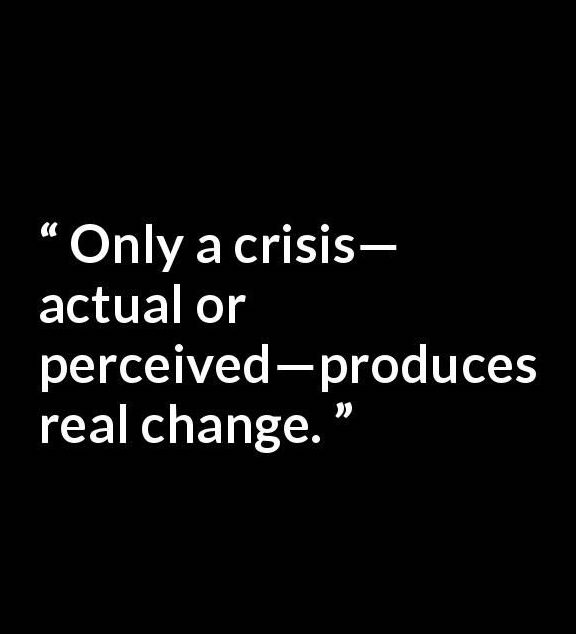 (Milton Friedman)
(Milton Friedman)
But then if we affiliate corporations, majority of our failed politicians & ‘leaders’ as “the bad guys” what about the “good guys”? The Bill Gates, the Leos (diCaprio) of the World, basically, us? Why couldn’t we get as organized and being as efficient as “the dark side” and realize if we really want to change the World and save humanity from extinction, we need to put billions of dollars into marketing and communication, storytelling and start to redistribute specific information in order to influence human behavior in such an organized manner as our governments and corporations who run our governments do? One of the many ways to solve the climate crisis is by influencing consuming behavior. If we can influence people what to think, ultimately we’re able to influence how they may behave. There is literally hardly any measurable and global scale positive impact as an outcome without necessary impact amplification. We need to inspire in order to educate. Failed buzzwords such as “sustainability” “impact ” “sustainable finance” “philanthropy” mean nothing positive in the mainstream knowledge, therefore all the clean tech and sustainability movements have failed and sunk.
If want to save the World we need to build it. We are called to be architects and engineers of our future, not its victims. It’s time to Worldbuild!
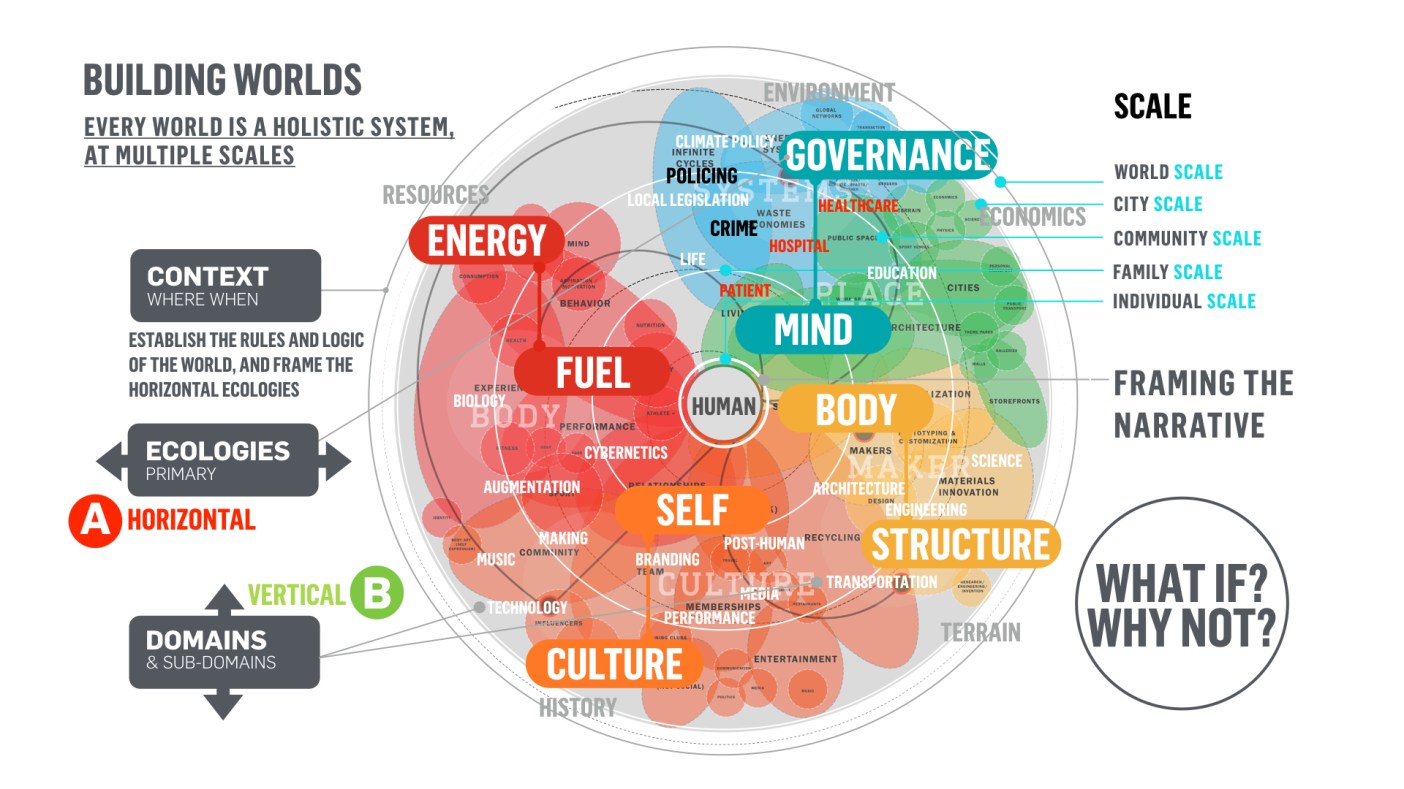
Alex McDowell Worldbuilding Mandala
Opportunity Emerges From Crisis
Modern civilization is experiencing a series of crises from many angles, ranging from environmental to democratic and, in truth, existential. Where others only see despair, we see opportunities emerging and, where there is chaos, lives the chance for new systems to grow. The films and filmmakers noted below make us question consumerism, capitalism, and democracy for the purpose of understanding, after which we rightly get angry and use our anger to build a new World, creating a prosperous protopia to replace the nihilist dystopia that is currently being presented it to us through the media and Hollywood.
1. The Great Dictator
The Great Dictator—Charlie Chaplin’s masterful satire of Adolf Hitler—began filming in September 1939, right at the start of World War II. By the time it was released in 1940, the Axis had been formed, and Nazis were already occupying much of France. The threat was not at all abstract: critic Michael Wood notes that the movie premiered that December, in London, amid German air raids. The film is brilliant on many levels it understands Hitler as a performer, as an orator wielding language like the unifying, galvanizing power that it is. But it also understands him as a psyche. It isn’t a psychological portrait, but nor is it so simple as a funhouse treatment of the coming war, all punchline and distortion. In the Trumpian era this film is nothing but relevant giving us the greatest speech ever made in film history by a silent film actor
2. Fight Club
“The things you own end up owning you.”
“An entire generation pumping gas, waiting tables, slaves with white collars. Advertising has us chasing cars and clothes, working jobs we hate so we can buy shit we don’t need. We’re the middle children of history, man. No purpose or place.We’ve all been raised on television to believe that one day we’d all be millionaires, and movie gods, and rock stars. But we won’t. And we’re slowly learning that fact. And we’re very, very pissed off.”
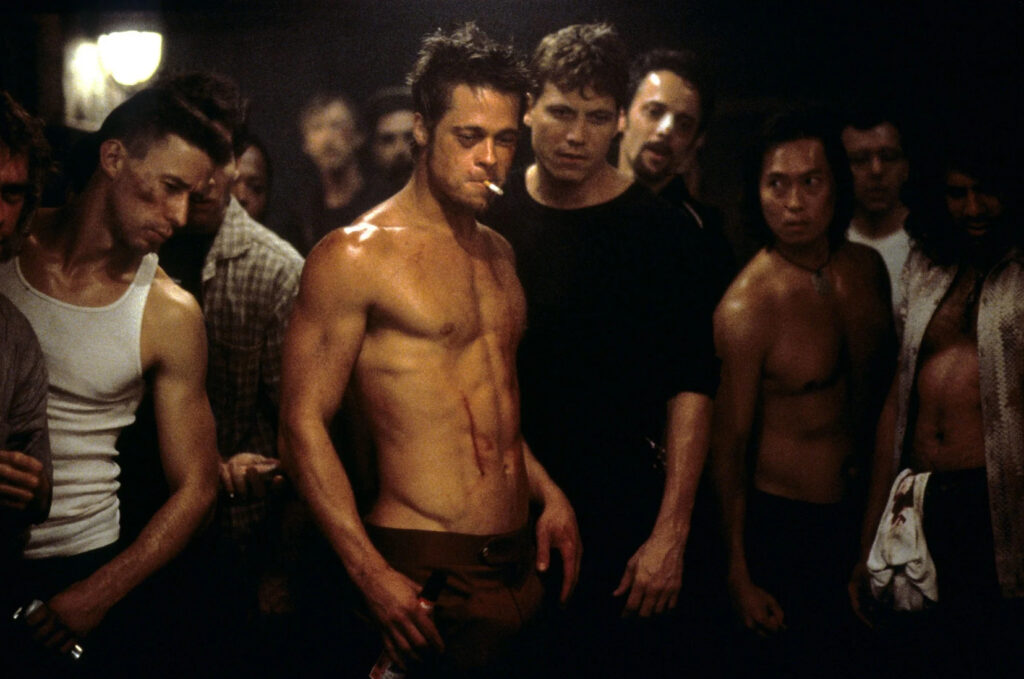
Photograph from 20th Century Fox / Everett
3. Citizenfour

Photograph Trevor Paglen
“Political language is designed to make lies sound truthful and murder respectable, and to give an appearance of solidity to pure wind. ”
I became obsessed with Laura Poitras after watching Citizenfour. All her documentaries are rooted in the importance of speaking truth to power and questioning everything. Without Edward Snowden and Chelsea Manning we would be still sitting in the dark, unaware of how embedded the government is in our lives. In surveillance capitalism, we must question what climate change and warmongering has to do with our (slowly disappearing) privacies and how they are interconnected. Kudos to Pierre Omydiar and First Look Media for funding this film.
4. The Century of Self
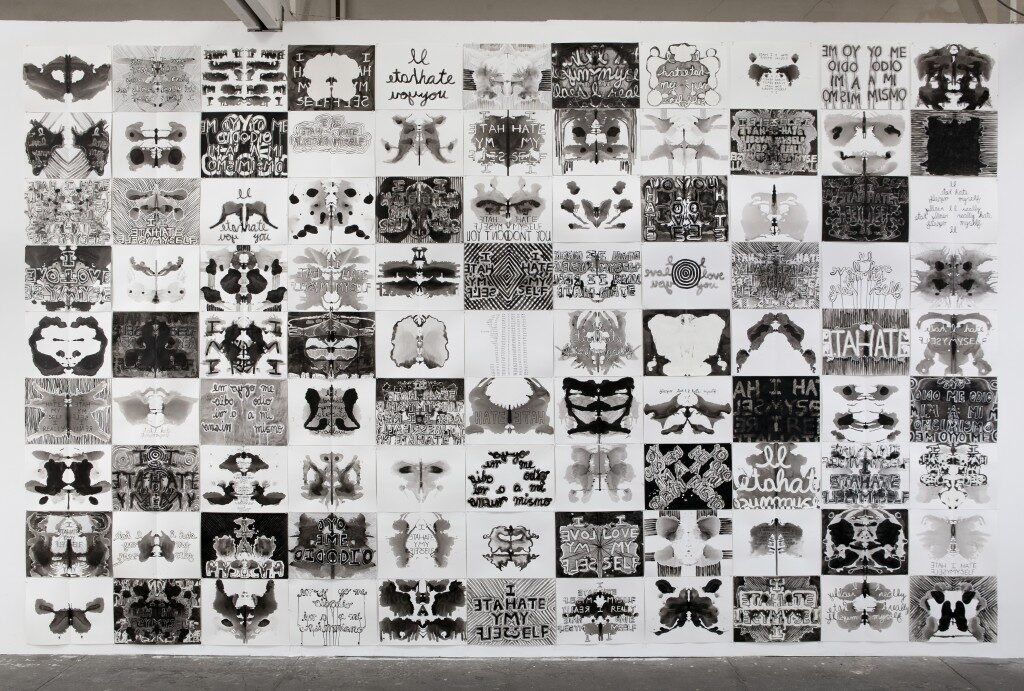
Untitled (selves), 2011, works on paper, each 20″ x 15″ by Alexandra Grant. Photo by Josh White.
Century of the Self’ advances the thesis that Freud’s views of the unconscious set the stage for corporations, and later politicians, to market to our unconscious fears and desires. Furthermore it shows how advertising once aimed to influence rational choice. This gave way in the early 20th century to advertising aimed to connect feelings with a product. Amazingly enough, at the root of this change was Sigmund Freud’s nephew, Edward Bernays. Bernays, an American propagandist in WWI, applied his wartime experience and his uncle’s theories of the unconscious to peacetime commerce. He invented the field of public relations, popularized press releases and product tie-ins, and changed public opinion about matters ranging from women smoking to the use of paper cups — all to increase sales. Viewing politics as just another product to sell, Bernays also helped Calvin Coolidge stage one of the first overt media acts for a president, and helped engineer the 1954 coup in Guatemala on behalf of his client the United Fruit Company, by painting their democratically elected leader as communist. If there was one documentary that I would want to force everyone to watch this would be it
5. The Lottery of Birth, Creating Freedom
Free markets, free elections, free media, free thought, free speech, free will–the language of freedom pervades our lives, framing the most urgent issues of our time and the deepest questions about who we are and who we want to be. It is a foundational concept at the heart of our civilization, but it has long been distorted to justify its opposite: soaring inequality, the erosion of democracy, an irrational criminal justice system, and a dehumanizing foreign policy. Raoul Martinez argues that the more we understand the limits on our freedom, the better placed we are to transcend them.
6. The Big Short
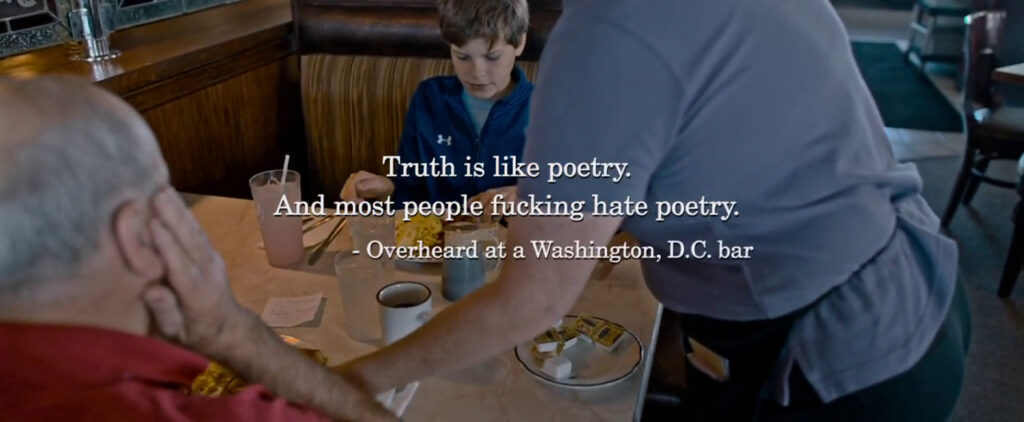
Photograph from Paramount Pictures
Probably my most watched film. I don’t usually re-watch films but ‘Big Short’ is an exception. The hoped outcome after watching the movie is that Americans will put down their smartphones and tune in to a Hollywood version of Occupy Wall Street, a movie about an event that happened nearly a decade ago, one that they’d probably like to forget. And then there’s the riskiest tranche of all: the bet that those who do see it will come away with not just an understanding of what a CDO looks like but a fuller awareness of the cornucopia of horrible human behavior that led to the biggest financial collapse since the Great Depression and that it will cause them to reflect on those traumatic events, which have arguably never been properly processed despite their corrosive effects on our politics and culture and psychology. And that ultimately this experience will lead to some kind of reckoning that causes us to face uncomfortable truths about responsibility and financial capitalism and our entire way of life. Oh, and that they’ll be entertained in the process.
7. Matrix

Photograph from Warner Brothers
The Matrix was a documentary from the future if we fucked up everything until the year 2030.
“Morpheus: She (the matrix) is the world that superimposes your look to keep you from seeing the Truth.
Neo: What truth?
Morpheus: That you are a slave. Like all the others you were born in chains. The world (the matrix) is a prison where there is neither hope nor taste nor smell, a prison for your mind”
8. There Will Be Blood
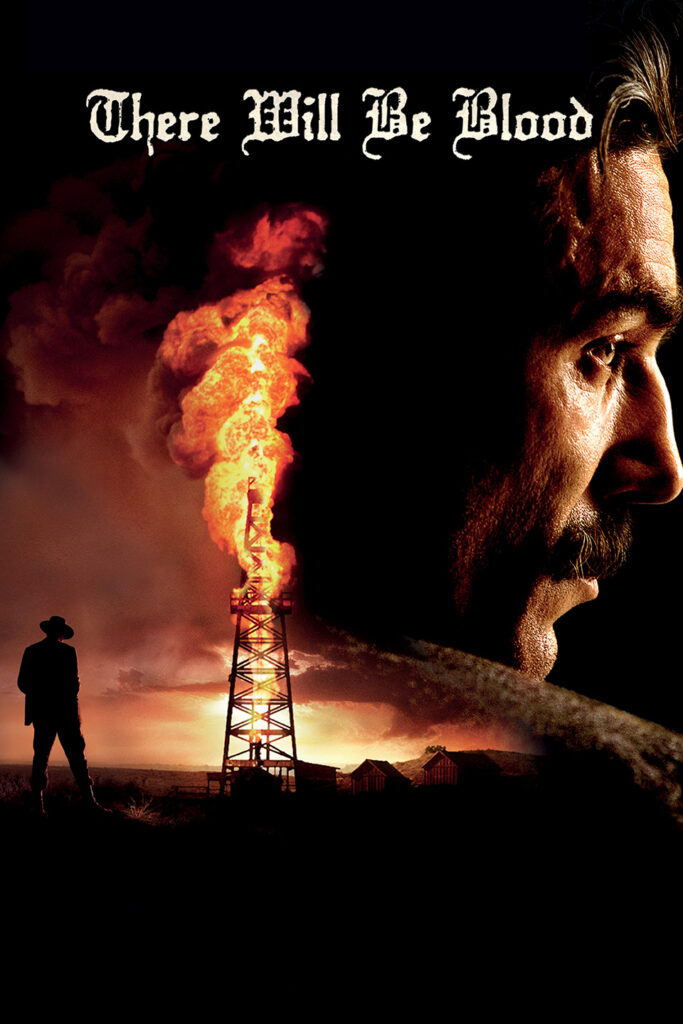 Paramount Vantage/Miramax
Paramount Vantage/Miramax
Paul Thomas Anderson’s masterpiece, freely adapted by him from Upton Sinclair’s 1927 novel Oil!, is a tragic parable of man’s dependence on this commodity: formerly the lubricant of commercial triumph and technological innovation, and now the dwindling lifeblood of our material prosperity, the unacknowledged driving force of our military conflicts, and even the cause of a coming ecological catastrophe. That dark title threatens a calamity now visible on the horizon: destruction of the Earth itself.
9. Crisis in Confidence Speech by Jimmy Carter in 20th Century Women
“Our people are losing that faith, not only in government itself but in the ability as citizens to serve as the ultimate rulers and shapers of our democracy. As a people we know our past and we are proud of it. Our progress has been part of the living history of America, even the world. We always believed that we were part of a great movement of humanity itself called democracy, involved in the search for freedom; and that belief has always strengthened us in our purpose. But just as we are losing our confidence in the future, we are also beginning to close the door on our past.
In a nation that was proud of hard work, strong families, close-knit communities, and our faith in God, too many of us now tend to worship self-indulgence and consumption. Human identity is no longer defined by what one does, but by what one owns. But we’ve discovered that owning things and consuming things does not satisfy our longing for meaning. We’ve learned that piling up material goods cannot fill the emptiness of lives which have no confidence or purpose.”
10. 12 Monkeys
 Photograph is from Universal Pictures
Photograph is from Universal Pictures
It seems, these days, as though the human race has passed a Rubicon and is now on a straight path toward the end of days, or at least the end of the social order as we know it. The most obvious threat is not a virus, but rather our degradation of the biosphere. The U.N.’s Intergovernmental Panel on Climate Change has made it clear that our ongoing ecological hubris means there’s precious little chance we will avoid planetary upheaval of the worst variety, and suggests we will probably fall off a cliff in the next dozen or so years. We are still obligated to try to mitigate the extremity of the climate disaster, but the existence of that disaster is more or less a done deal. The 12 Monkeys offers a vision of the curious joy and hope that we must embrace when all conventional forms of it have been lost.
11. Four Horsemen
‘Four Horsemen’ is an award winning independent feature documentary which lifts the lid on how the world really works. As we will never return to ‘business as usual’, 23 international thinkers, government advisors and Wall Street money-men break their silence and explain how to establish a moral and just society. ‘Four Horsemen’ is free from mainstream media propaganda — the film doesn’t bash bankers, criticise politicians or get involved in conspiracy theories. It ignites the debate about how to usher a new economic paradigm into the world which would dramatically improve the quality of life for billions.
“The crises we face today, are created by humans. And what can be created by humans, can be changed by humans. So, we are all capable of transforming our world.” – Satish Kumar
The bottom line is stories we tell literally make the world. If we want to change the world, we need to change our story. This truth applies both to individuals and institutions as those who tell the stories rule the world.
Susanna
Footnotes:
1*: I use “quotation marks” marks when I write about democracy because what we know as “democracy” has nothing to do with the words original meaning. Supposedly it would mean in Greek: δημοκρατία dēmokratía, literally “rule by people”. Our current political systems have nothing to do with democracy as people are driven by corporate interests, therefore what we have globally is Corporatocracy , from corporate and Greek: -κρατία, romanized: -kratía, lit. ‘domination by’. Basically our economic and political systems are controlled by corporations or corporate interests.
2*: I use the word “influence” throughout the text a lot but what I really mean is manipulation
